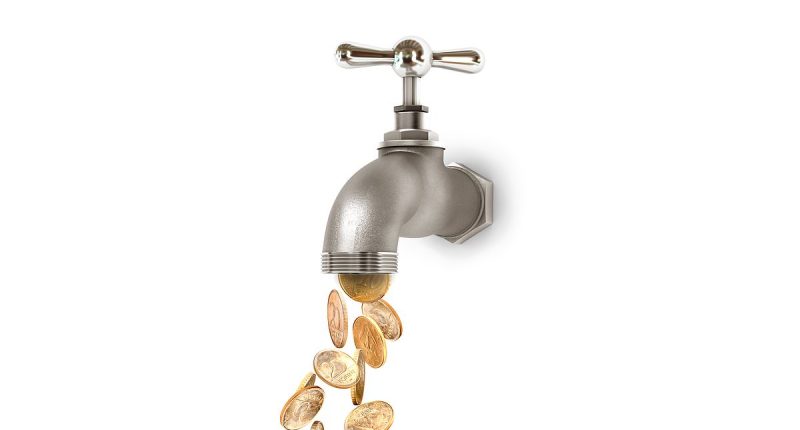Share this @internewscast.com
The cost of living has surged again, driven up by a sharp rise in household bills last month. So called ‘Awful April’ brought a barrage of bill hikes on everything from energy and water to broadband bills and car tax.
Council tax bills increased £109 on average, energy bills by £111, water bills by £123, and £50 was added to the typical annual phone and broadband bill. That drove inflation up to 3.5 per cent, official figures confirmed last week.
But for investors willing to do their homework, there is an innovative way to get help with the rising cost of all the essentials. Investing in the companies that are raising your bills could be an effective way to earn an income large enough to cover what they charge you.
Dan Coatsworth, from the investment platform AJ Bell, says: ‘Most of the companies on the stock market charging us these bills pay generous dividends – you could buy their shares and use the income payments to settle up. In doing so, you are effectively handing them back their own cash.’
Of course, it may not make sense to buy shares in companies just because you are their customer. But there can be opportunities among firms that provide these basic household services, such as energy and insurance.
Here, experts suggest their top picks in each category – and how much you would need to invest to cover your bills, although of course you could buy less to cover part of them.

Money on tap: Investing in the companies that are raising your bills could earn an income to cover what they charge you
Energy bills
The energy price cap, which dictates the maximum households can be charged for each unit of gas and electricity, increased by 6.4 per cent in April, bringing the typical annual bill to £1,849, although it will fall again by £129 a year in July.
Centrica, which owns British Gas, yields 3 per cent, and SSE, which supplies about five million British households, 3.6 per cent. You would need to invest about £50,000 in the latter to generate a large enough dividend to pay your annual energy bill.
Charles Luke, manager of the Murray Income investment trust, points to National Grid as one reliable dividend payer in the energy space. ‘It is a very solid business and benefits from the fact that we need to invest in our infrastructure as part of the energy transition,’ he says. Shares currently yield 4.5 per cent. Mr Coatsworth suggests looking beyond the major providers to Telecom Plus, which owns the Utility Warehouse brand and yields a healthy 4.8 per cent.
An investment of about £38,500 would generate enough income to cover the bills.
Insurance
A typical car insurance policy now costs £589, and for home buildings and contents insurance you can expect to pay £393, according to the Association of British Insurers. That’s a combined annual insurance bill of £982 on average.
At 2.4 per cent, Direct Line’s dividend yield is nothing to write home about. Admiral, which insures about 5.7 million cars in the UK, looks more interesting, with a yield of about 4.4 per cent.
Aviva yields a chunky 6.5 per cent. An investment of £9,100 would produce a dividend large enough to cover the average car insurance premium. Meanwhile, a £6,250 investment in Mony Group, which owns the comparison site MoneySuperMarket and yields 6.3 per cent, could generate enough to cover the home insurance.
Phone and broadband
Mid-contract price hikes meant some customers saw their phone and broadband bills increase by as much as 7.5 per cent in April.
Vodafone shares currently yield a hefty 8 per cent, but such a high yield raises questions about sustainability. The yield is a company’s dividend expressed as a percentage of its share price, so when the share price falls, the yield rises. This might look attractive but isn’t necessarily. Vodafone shares are down 9.6 per cent over the past year, and down 42 per cent over five years.
Remember in general that high yields are not the only measure to look out for – you’ll need to do your research to make sure you understand the business.
A company may look like it’s offering a great deal, but have a systemic problem that means future earnings could be lower than expected.
Simon Gergel, manager of the Merchants investment trust, says: ‘Focusing specifically on yield can be quite dangerous, and some of the highest yielding stocks can be value traps.’
One helpful indicator to give you an idea of whether the annual payout could be cut in future is the dividend cover ratio. This indicates how many times over a company can afford to pay its dividend. Anything below one suggests a firm is borrowing to fund its payout, which can be a sign of trouble.
Ben Kumar, from the wealth manager 7IM, adds: ‘Remember also that dividends are not guaranteed. Companies can, and do, cut them.
Shares in the telecoms giant BT yield 5 per cent. An £11,000 investment could bring in enough to cover the typical £550 annual cost of phone and broadband.
Water
Water bills leapt by 26 per cent in April, bringing the average annual cost to £603. Getting a water meter can help reduce that, particularly if there are fewer people in your property than it has bedrooms. Alternatively, you could make the water providers pay for you.
Severn Trent, which serves about 4.6 million UK households, yields an attractive 4.5 per cent. Dan Coatsworth prefers United Utilities, which yields a fraction more at 4.6 per cent. A £13,100 investment could produce enough income to do the job.
Mr Kumar says: ‘While dividends tend to keep pace with broad inflation over time, that is different to the specific inflation on your bills.
‘Overall inflation is 3.5 per cent right now, but water bills just went up 26 per cent – so you might have to invest considerably more in the future to ensure your dividend income keeps pace with increases.’

Spread your risk
Cherry-picking individual stocks can be risky, so you might feel more comfortable letting a professional do the work. Income funds can provide a reliable dividend while spreading their risk across dozens of different stocks.
Murray Income Trust is a so-called Dividend Hero – a fund that has increased its dividend for at least 20 consecutive years.
Its top holdings include National Grid, HSBC, and BP, which is good news for those worried about petrol prices. It yields 4.55 per cent.
Merchants Trust, which has increased its dividend for 43 consecutive years, yields 5.4 per cent and its top holdings include Lloyds Banking Group and SSE.
How it works
When you buy shares in a company you get a vote at the firm’s annual general meeting and you share in its profits.
Your money could grow if the company share price rises – or your investment could fall if the share price goes down.
But on top of this when a business is profitable it rewards shareholders with a payout called a dividend.
The amount is expressed as a percentage. So if you invest £1,000 in a company and it pays a 5 per cent dividend, you’ll get £50.
When you get a dividend you can choose either to reinvest it or take the money as cash.
DIY INVESTING PLATFORMS
AJ Bell

AJ Bell
Easy investing and ready-made portfolios
Hargreaves Lansdown

Hargreaves Lansdown
Free fund dealing and investment ideas
interactive investor

interactive investor
Flat-fee investing from £4.99 per month
InvestEngine

InvestEngine
Account and trading fee-free ETF investing
Trading 212
Trading 212
Free share dealing and no account fee
Affiliate links: If you take out a product This is Money may earn a commission. These deals are chosen by our editorial team, as we think they are worth highlighting. This does not affect our editorial independence.
Compare the best investing account for you












